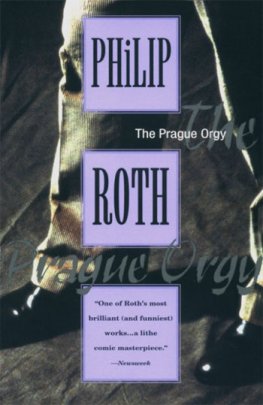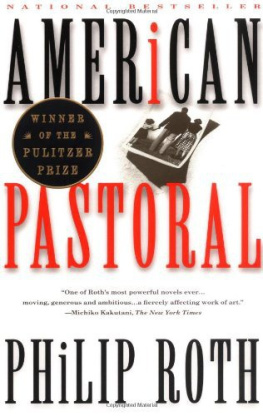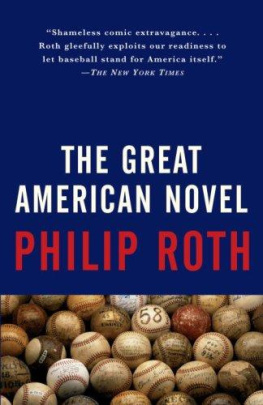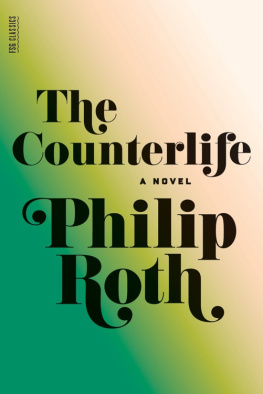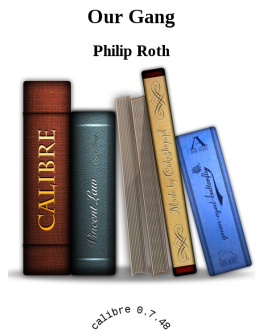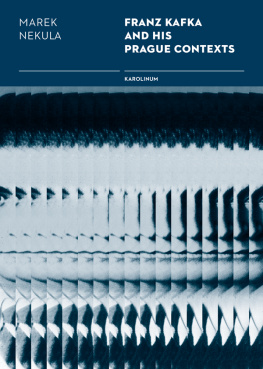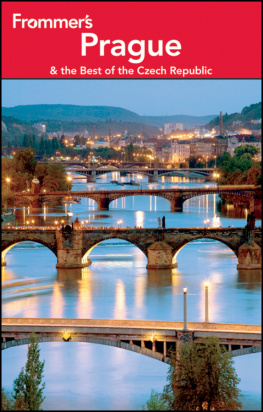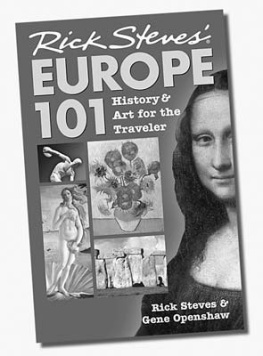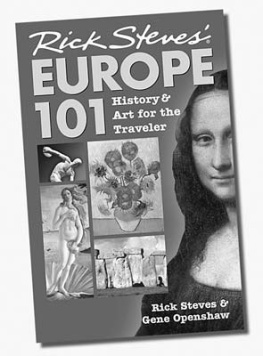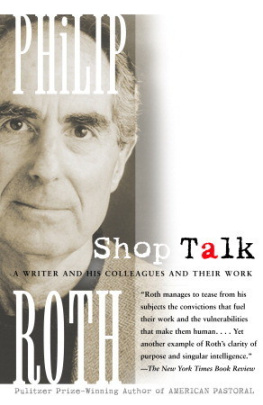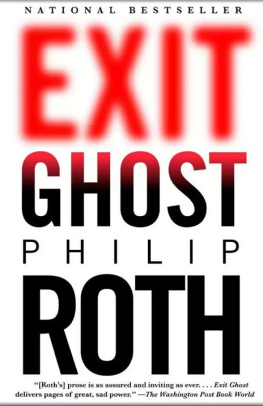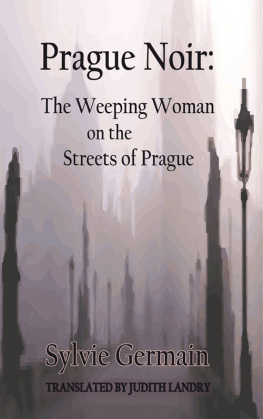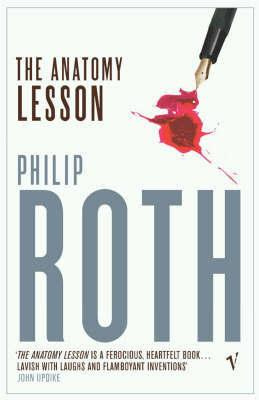PHILIP ROTH
THE PRAGUE ORGY
from Zuckermans notebooks
New York, Jan. 11. 1976
Your novel, he says, is absolutely one of the five or six books of my life.
You must assure Mr. Sisovsky, I say to his companion, that he has flattered me enough.
You have flattered him enough, she tells him. A woman of about forty, pale eyes, broad cheekbones, dark, severely parted hair a distraught, arresting face. One blue vein bulges dangerously in her temple as she perches at the edge of my sofa, quite still. In black like Prince Hamlet. Signs of serious wear at the seat of the black velvet skirt of her funereal suit. Her fragrance is strong, her stockings laddered, her nerves shot.
He is younger, perhaps by ten years: thick-bodied, small, sturdy, with a broad, small-nosed face that has the ominous potency of a gloved fist. I see him lowering the brow and breaking doors down with it. Yet the longish hair is the hair of the heartthrob, heavy, silky hair of an almost Oriental darkness and sheen. He wears a gray suit, a faintly luminous fabric, the jacket tailored high under the arms and pinching a little at the shoulders. The trousers cling to a disproportionately powerful lower torso a soccer player in long pants. His pointed white shoes are in need of repair; his white shirt is worn with the top buttons open. Something of the wastrel, something of the mobster, something too of the over-privileged boy. Where the womans English is heavily accented, Sisovskys is only mildly flawed, and articulated so confidently with oddly elegant Oxonian vowels that the occasional syntactical contusion strikes me as a form of cunning, an ironical game to remind his American host that he is, after all, only a refugee, little more than a newcomer to the tongue mastered already with so much fluency and charm. Beneath all this deference to me, I take him to be one of the strong ones, one of the stallions who has the strength of his outrage.
Tell him to tell me about his book, I say to her. What was it called?
But on he continues about mine. When we arrived in Canada from Rome, yours was the first book that I bought. I have learned that it had a scandalous response here in America. When you were so kind to agree to see me, I went to the library to find out how Americans have perceived your work. The question interests me because of how Czechs perceived my own work, which also had a scandalous response.
What was the scandal?
Please, he says, I dont wish to compare our two books. Yours is a work of genius, and mine is nothing. When I studied Kafka, the fate of his books in the hands of the Kafkologists seemed to me to be more grotesque than the fate of Josef K. I feel this is true also with you. This scandalous response gives another grotesque dimension, and belongs now to your book as Kafkologine stupidities belong to Kafka. Even as the banning of my own little book creates a dimension not at all intended by me.
Why was it banned, your book?
The weight of the stupidity you must carry is heavier than the weight of banning.
Not true.
I am afraid it is, cher matre. You come to belittle the meaning of your vocation. You come to believe that there is no literary culture that matters. There is a definite existential weakening of your position. This is regrettable because, in fact, you have written a masterpiece.
Yet he never says what it is about my book that he likes. Maybe he doesnt really like it. Maybe he hasnt read it. Much subtlety in such persistence. The ruined exile will not be deflected from commiserating with the American success.
Whats he want?
But its you, I remind him, whos been denied the right to practice his profession. Whatever the scandal, I have been profusely bizarrely rewarded. Everything from an Upper East Side address to helping worthy murderers get out on parole. Thats the power a scandal bestows over here. Its you whos been punished in the harshest way. Banning your book, prohibiting your publication, driving you from your country what could be more burdensome and stupid than that? Im glad you think well of my work, but dont be polite about cher matres situation, mon cher ami. What made what you wrote such a scandal?
The woman says, Zdenek, tell him.
What is there to tell? he says. A satirical smile is harder for them than outright ideological fanaticism. I laughed. They are ideologues. I hate ideologues. That is what causes so much offense. It also causes my doubt.
I ask him to explain the doubt.
I published one harmless little satire in Prague in 1967. The Russians came to visit in 1968 and I have not published anything since. There is nothing more to say. What interests me are these foolish reviews that I read in the library of your book. Not that they are foolish, that goes without saying. Il is that there is not one which could be called intelligent. One reads such things in America and one is struck with terror for the future, for the world, for everything.
Terror for the future, even for the world, I understand. But for everything? Sympathize with a writer about his foolish reviews and you have a friend for life, Sisovsky, but now that this has been achieved, Id like to hear about your doubt.
Tell him about your doubt, Zdenek!
How can I? I dont believe in my doubt, frankly. I dont think I have any doubt at all. But I think I should.
Why? I say.
I remember the time before the invasion of Prague, he says. I swear to you that every single review of your work could not have been published in Prague in the sixties the level is too low. And this in spite of (he fact that according to simplified notions we were a Stalinate country and the U.S.A. was the country of intellectual freedom.
Zdenek, he wants to hear not about these reviews he wishes to hear about your doubt!
Calm down, he tells her.
The man is asking a question.
1 am answering it.
Then do it. Do it. He has told you already that you have flattered him enough! Italy, Canada, now New York she is as sick of him as of their wandering. While he speaks her eyes momentarily close and she touches the distended vein in her temple as though remembering yet another irreversible loss. Sisovsky drinks my whiskey, she refuses even a cup of tea. She wants to go, probably all the way back to Czechoslovakia, and probably on her own.
I intervene before she can scream and ask him, Could you have stayed on in Czechoslovakia, despite the banning of your book?
Yes. But if I had stayed in Czechoslovakia, I am afraid I would have taken the way of resignation. I could not write, speak in public, I could not even see my friends without being taken in for interrogation. To try to do something, anything, is to endanger ones own well-being, and the well-being of ones wife and children and parents. I have a wife there. I have a child and I have an aging mother who has already been deprived of enough. You choose resignation because you realize that there is nothing to be done. There is no resistance against the Russification of my country. The fact that the occupation is hated by everyone isnt any defense in the long run. You Americans think in terms of one year or two; Russians think in centuries. They know instinctively that they live in a long time, and that the time is theirs. They know it deeply, and they are right. The truth is that as time goes by, the population slowly accepts its fate. Eight years have passed. Only writers and intellectuals continue to be persecuted, only writing and thinking are suppressed; everybody else is content, content even with their hatred of the Russians, and mostly they live better than they ever have. Modesty alone demands that we leave them be. You cant keep clamoring about being published without wondering if it is only your vanity speaking. I am not a great genius like you. People have Musil and Proust and Mann and Nathan Zuckerman to read, why should they read me? My book was a scandal not only because of my satirical smile but because in 1967 when I was published I was twenty-five. The new generation. The future. But my generation of the future has made better peace with the Russians than anyone. For me to stay in Czechoslovakia and make trouble with the Russians about my little books why? Why is another book from me important?

